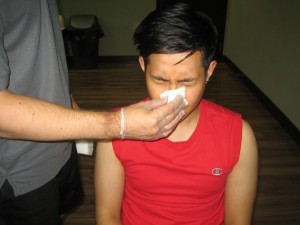Dengue fever is a disease caused by the mosquito-borne flavivirus, Dengue virus (DENV). Other viruses that come from the family Flaviviridae, genus Flavivirus include West Nile Virus, Yellow Fever Virus and a number of other viruses that may lead to encephalitis. Apart from dengue fever, the DENV may also lead to Dengue Hemorrhagic Fever (DHF) or Dengue Shock Syndrome (DSS), which are both life-threatening syndromes.
Dengue fever is a fairly common disease in the tropic and subtropic countries, particularly during the rainy seasons. Each year, there is an estimated 100 million new cases. Its principal mosquito vector is the Aedes aegypti, wherein the virus is transmitted through a bite. Individuals who are immunocompromised are more at risk of getting dengue fever.
Dengue fever has four subtypes/ serotypes: DENV-1, DENV-2, DENV-3 and DENV-4, with DENV-2 as the most common. Thus, an individual who has previously gotten dengue fever may still get dengue fever because the body only develops antibodies against a particular subtype. Dengue fever is also known as breakbone fever and dandy fever.
https://www.youtube.com/watch?v=0PUsdv1kDTc
Symptoms of Dengue Fever
The incubation period of dengue fever is approximately four days. After this period, the individual will begin to experience the symptoms. The first symptoms to appear are sudden, high-grade fever, widespread skin rash and severe headache. These three symptoms are called the dengue triad as these symptoms are always present in cases of dengue fever. The other symptoms include:

- Severe joint and muscle pain
- Pain behind the eyes, especially upon movement
- Aching in the lower back
- Exhaustion
- Swollen lymph nodes
- Nosebleed
- Blood in the gums
- Nausea and vomiting
First Aid Management of Dengue Fever
The primary goal of treatment for dengue fever is to relieve the symptoms and avoid dehydration. Mild cases of dengue fever can be managed at home but severe cases would require medical assistance. If not treated properly, dengue fever may lead to dehydration, shock and death. With proper treatment, symptoms of dengue fever last for a week. Antibiotics cannot be used to treat dengue fever.
- Do not engage in strenuous activities. Take plenty of rests.
- Drink plenty of clear fluids, particularly water, fruit juices and sports drinks to avoid dehydration. Severe cases may require IV fluids.
- Take paracetamol to relieve of pain and fever symptoms. Ibuprofen, naproxen and aspiring may cause bleeding problems if taken.
Taking First Aid Courses can help in managing dengue fever.
How to Prevent Dengue Fever
At present time, there are not vaccines to combat dengue fever. However, there are certain precautions that can be done to prevent dengue fever. Consider:
- Mosquitoes are known to lay their eggs in stagnant waters, such as vases and ponds. Try to avoid the formation of these stagnant waters by changing/ draining the waters every few days.
- Wear long sleeves, long pants, socks, shoes and other protective clothing when going outdoors.
- Use mosquito repellants.
- Ensure that homes are well-screened.
- The Aedis mosquitoes are most active at dawn and dusk, thus it is best to avoid performing activities at this time.
Dengue fever is a disease caused by the mosquito-borne flavivirus. It causes sudden, high-grade fever, body-wide skin rash and severe headache in its victims.
Online Source:
